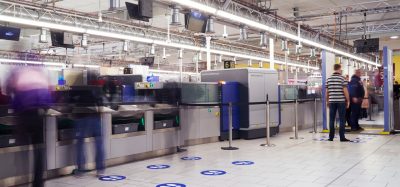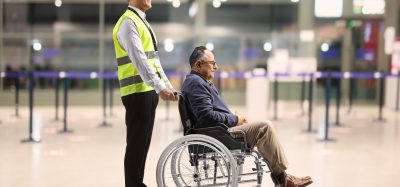Everyone’s talking about AI, data and biometrics in baggage handling
- Like
- Digg
- Del
- Tumblr
- VKontakte
- Buffer
- Love This
- Odnoklassniki
- Meneame
- Blogger
- Amazon
- Yahoo Mail
- Gmail
- AOL
- Newsvine
- HackerNews
- Evernote
- MySpace
- Mail.ru
- Viadeo
- Line
- Comments
- Yummly
- SMS
- Viber
- Telegram
- Subscribe
- Skype
- Facebook Messenger
- Kakao
- LiveJournal
- Yammer
- Edgar
- Fintel
- Mix
- Instapaper
- Copy Link
Posted: 3 November 2021 | International Airport Review | No comments yet
In Issue 5 of International Airport Review we spoke to Westjet, BagsID and Geneva Airport to hear their thoughts on AI, data and biometrics in baggage handling.


Artificial intelligence (AI) and biometrics are improving the way we travel. From passenger facial recognition allowing quicker check-in, security clearance and onboarding, to data-driven automation helping airlines provide more informed dynamic pricing – we’re living in a faster, more efficient, tech-driven world. But can the same be said for baggage? International Airport Review spoke to three aviation stakeholders to hear their thoughts.


Peter Feldstein
Director of Airports Transformation at Westjet
“Inertia is a real challenge for the aviation industry as a whole. We’ve seen tremendous technological advances in all sectors over the past few decades. The technology around baggage handling, however, has remained largely unchanged for many years, relying on one-dimensional barcodes. Departure control systems, baggage sortation systems and related airport infrastructure are built around the existing standards.
“In order to be ready for new technology tomorrow we need to build flexibility into all our systems today. I envision a future where there doesn’t need to be a single standard for baggage, and industry hardware and software can accommodate different technologies that work seamlessly together. This would open the door to AI, biometrics, or other yet-unimagined options.
“Evolving the baggage experience will take strong partnerships between the airlines, airports, baggage handlers and third-party technology companies.
“At WestJet we are always striving to create seamless, consistent experiences and we’ll continue to innovate to improve the experience for our guests.”
If baggage has always been the problem child of aviation, the inevitable digital transformation in baggage processing will make parents smile again, especially climate conscious ‘parents’ and ‘parents’ on a budget”


Marlon Van der Meer
Founder and CEO of BagsID Network
“Biometric recognition technology is the future. This fact cannot be ignored by anyone, especially in the airline industry. This has been shown across check-in, security, and boarding, to name a few.
“Where image-based recognition technologies are currently not acknowledged is the baggage journey. Capturing more data is the industry’s only answer to their ongoing baggage problems. The cheapest way to capture data is through computer-vision. It’s not a case of if the outdated, antiquated current systems in use will change, it’s when.
“Layered on top of this is the important subject of aviation sustainability. The world needs change, and a greener baggage journey benefits airlines, airports, the passenger, and the planet. Unnecessary paper waste, which in 2019 accounted for over 40 million kilograms of paper, is only one aspect. And if baggage has always been the problem child of aviation, the inevitable digital transformation in baggage processing will make parents smile again, especially climate conscious ‘parents’ and ‘parents’ on a budget.
“Change is rarely instant, and the behemoth called baggage isn’t going to change tomorrow, but we’re here and committed to making sure it does. Can you imagine a world with no bag tags? We can. It’s coming by 2030.”


Sara Branco
Baggage Handling Expert for Geneva Airport
“In the current aviation context, we face many challenges, personal but also professional ones and finding new and innovative ideas in an industry that has an history of the same procedures and work ethics can be perceived as ambitious. However, we (airports, airlines and ground handlers) aim to achieve the same goal: passenger satisfaction when travelling through our grounds and flying with our partners.
“Nowadays, what can enhance the passenger experience is the product differentiation. This means a constant rethink and update of what the passenger and specific targets want and demand, as well as making sure that can be put into practice regardless of the season, the traffic or the geographical location.
Finding new and innovative ideas in an industry that has an history of the same procedures and work ethics can be perceived as ambitious. However, we (airports, airlines and ground handlers) aim to achieve the same goal: passenger satisfaction”
“The talk in baggage handling has now turned to AI, data and biometrics. There has been tremendous innovation in the aviation industry and within baggage in the past two years that can and will make our jobs easier increasing the traceability, viability and time gain in baggage handling treatment.
“However, the costs and the time it demands to be put in place, as well as the compatibility with the existing systems demand a common agreement and discussion that we airports are willing to start so that we can start building today a better, more efficient and clever future for our industry. AI and the use of data is the future, but several questions remain that must be answered: is it user friendly? Is the passenger willing to share his or her data? Are we ready for that change? When nothing is certain, anything is possible…”
Issue
Related topics
Artificial intelligence (AI), Baggage handling, Big data, Biometrics, Passenger experience and seamless travel


















